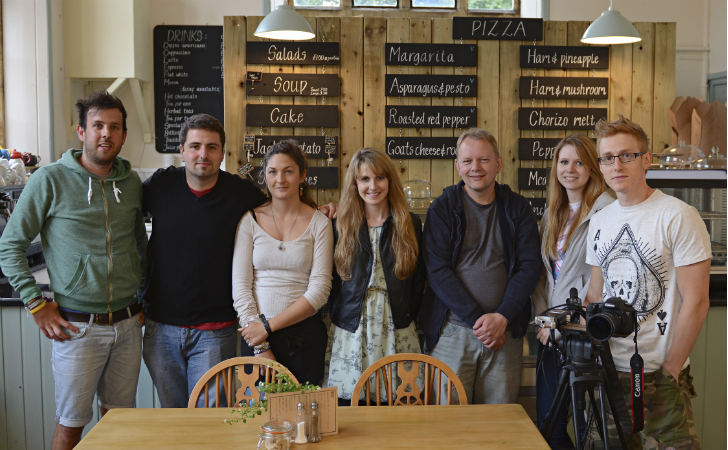
- Cast and crew of ‘The Hunted’. Left to right: Will Fahy, Arran Dutton, Sophie Goddard-Jones, Louise Ennever, Robert Prince, Hollie Hayton and James Barber. Photo by www.willfahy.co.uk
The Awkward Conversations We Have is a series of five self-contained short films directed by Street based James Barber and written by Arran Dutton from Glastonbury. Released online throughout October and November their aim was to capture awkward conversations that could feasibly take place somewhere on this crazy planet of ours, although Arran admits that he hopes most of them wouldn’t – especially the one from their finale Necrophilia.
Now that the series has come to a close, (and you can watch them all via the links down the right hand side of this interview) the real work begins in trying to reach larger audiences after launching initially with a screening at Glastonbury’s Red Brick Building and a low key promotion on social media. In 2014, Arran and James hope that more people will embrace The Awkward Conversations We Have. Kevin McGough of the The Fix had a chat with writer and series creator Arran Dutton to find out more about the project.
Congratulations to you both this is a dark but very witty drama that deals with a difficult subject matter sensitively while still drawing many laughs along the way. First off how did the project come about?
A few years ago I decided to self-produce my own material as I was fed up of writing scripts and sending them off only to be rejected. I was left with a feeling that no one was ever going to see my work and it didn’t sit well with me, so I got together with a friend who was an audio engineer and we hired a studio and local actors and created an independent radio series called Unholy Behaviour. During one of those sessions we also recorded an audio short called The Visitor with the two lead actors, Gary McKinven and Robert Prince, which stemmed from an idea I had about an alien coming to our planet to try and land a job in the adult entertainment industry. The script consisted of one scene set in the living room of a casting agent for that industry and was based around an awkward conversation between a dangerous extraterrestrial and a man who didn’t want to jeopardise his professional career by commissioning something as outrageous as inter-species pornography. It was pretty weird and I don’t think many (or any) people liked it, but I loved it.
A few years later I met James after a friend, Will Fahy, introduced us and after our first conversation we knew we wanted to work together to produce video content. I had already toyed with the idea of writing other audio shorts under the title of The Awkward Conversations We Have because I liked the idea of being able to produce content quickly and at low/no cost and build upon my writing portfolio. Obviously, producing video can also be expensive and because we were looking to produce content together on a low budget, I threw the idea at James with the story of two parents telling their son that they were swingers being just one we could explore. He liked it and didn’t just want to film one of these conversations, so we put our heads together and eventually came up with twenty ideas, which we then whittled down to ten. I wrote ten scripts and we picked the strongest five to produce. Now they’re out there!
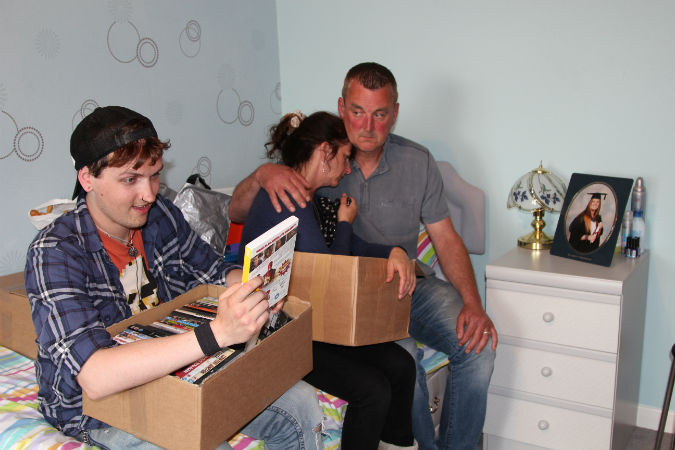
- On set for ‘Sarah’. Left to right: Jon Coyne, Angela Bell and Gary McKinven.
Was it a difficult process? That is to say, how did you set about making an empathetic comedy based on such a sensitive matter as parents dealing with the tragic loss of their child as you did in ‘Sarah’?
To be honest, I didn’t find the writing of the series to be that difficult and it sounds terrible but with ‘Sarah’ In particular I didn’t put that much thought into it, I just had the idea and wrote it, but the one thing I wanted to do was to show that there is some kind of light at the end of the tunnel. For me the character of Matty just being there brings the parents closer together again as they unite when faced with this situation whereas at the beginning there was a clear division between them. We showed four films at a screening recently and this was the least favourite for most with some people saying that they didn’t feel It went anywhere. I personally disagree for the reasons I just stated. I like to think that one day these characters will look back on that situation and see the humour amongst the adversity. Although we decided to take it out, I do regret that we didn’t include the moment when the parents share a chuckle at the expense of Matty when they find out that their daughter rejected him romantically. For me, that showed a glimpse of how people do move on when faced with adversity, find happiness amongst the pain and still enjoy moments in life despite such a great loss.
It seems clear that this drama wants the viewer to cringe and even hide behind the sofa, following in the footsteps of shows like Curb Your Enthusiasm, The Office, and Peep Show which also excelled in humorously making their audiences uncomfortable. Who would you say most inspired the style and content? And how did this translate to the finished product we see today?
Larry David is my scriptwriting idol; ever since I was introduced to Curb by a friend at Uni, it completely revolutionised the way I write. For me, it’s had a huge impact on this series. Of course, Curb is unscripted, but for me that influenced my dialogue because not every comment within a conversation is funny and so to me it feels more authentic amongst the narrative. I wanted these conversations to have an air of authenticity and knew that within them there would be questions asked that have great importance and could greatly affect the characters lives, so the dramatic element was important to me because I didn’t want people to forget that. Curb Your Enthusiasm is perhaps driven more so by dialogue than most comedies you see and due to our budget and time restrictions I felt that The Awkward Conversations We Have would be the same in order to explore the situation fully and add substance to what is going on.
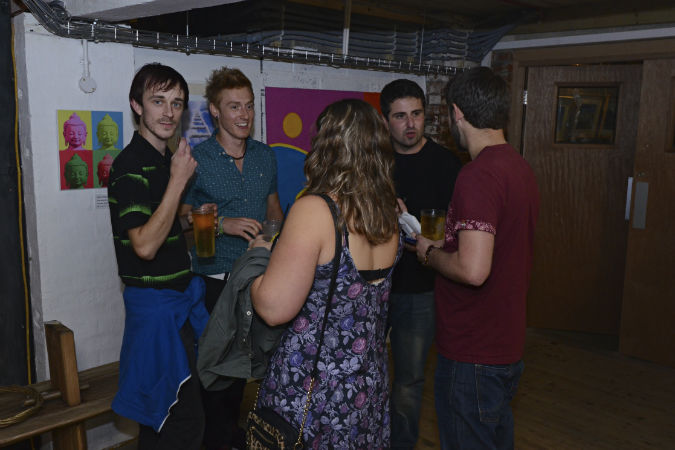
- James Barber and Arran Dutton speak with local filmgoers and The Awkward Conversations We Have screening in Glastonbury
The issue of where entertainment should draw the line of good taste is in the press at the moment following the release of the new US TV sitcom in which Michael J Fox makes light of a man suffering Parkinsons (http://www.independent.co.uk/arts-entertainment/tv/features/the-michael-j-fox-show-putting-parkinsons-at-the-heart-of-the-story-8820261.html). Where do you think the line is or should be when it comes to sensitive or darker material?
I’m sure every person will have a different view as to where the line is and with so much available to watch nowadays a line will continually be pushed as writers look to avoid creating something clichéd. Naturally as history shows, issues that were a taboo once upon a time are now approached more openly within society, but if a writer is daring enough to go over the line and an audience is receptive then they will be lauded for having done something revolutionary. That’s what writers should strive for.
Regarding Michael J Fox’s new sitcom, there’s an opportunity to educate people about Parkinsons and create awareness about it, and no doubt he’s seen an opportunity to relay some of his frustrations as to how it affects his every day life. In Curb Your Enthusiasm there’s an episode where Larry David doesn’t want to say he’s playing golf in front of a wheelchair user because he feels it’s insensitive. Of course, it isn’t and the wheelchair user tells him that later, so within those few lines of dialogue there is an exploration of prejudice in that although some people think they are being sensitive, really pitying someone who is disabled is just another way of looking down on them. So if someone watches that and thinks, “shit, I’ve done that before” and then becomes aware of it, then surely that’s a good thing.
In “Sarah’, the drama is realistic and the writing is very empathetic to the issues discussed. What experiences of your own personal loss did you draw upon to help empathise with this situation and characters?
I haven’t lost anyone very close to me but I have witnessed the effect it can have on people both in reality and through representations in the media. So for me writing that dramatic content stems from that. I feel I’m naturally quite sensitive and therefore I know how to behave in delicate situations, so as soon as the idea to interrupt this family during a time where they were in grief came about, it was just a case of making sure Matty was ignorant to etiquette more so than malicious and then being aware that when people are emotionally on edge and worn out, any ill-judged comment or simple mistake can feel severely worse.
What made you feel that Gary, Angela and Jon were suitable for what you trying to achieve?
I had worked extensively with Gary and Angela before and had seen them play intense dramatic scenes in theatre productions, so I knew they could handle the gravity of the situation. They’re both brilliant actors who dig deep to explore a character and prepare well for any role. I’d seen them act against each other in comedy before and they have great chemistry, so I imagined they’d work well against each other and I think that it shows in ‘Sarah’.
With Jon, he just came in and nailed it. I hadn’t seen him before and it was a case of we needed a young-ish guy, he was suggested and he was good.
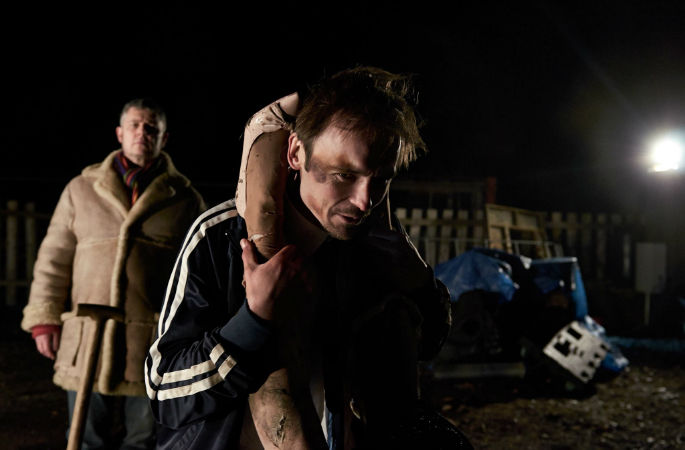
- Stuart Packer (left) and Ben Ellis in ‘Necrophilia’ – Legs made up by Daisy Lailey Make-Up (Site linked in footer)
What other characters/topics will you deal with in the future?
In all honesty, I tend to strip back to the mechanics of comedy and the books about comedy scriptwriting that I’ve read when I begin each project and I firstly land on my belief that the most awkward and relatable subjects are love, sex and death. Everyone thinks about it, but there is so much complexity within each of those subjects. To complement this, I remember reading about what can drive comical situations and examples that can be found in every single comedy; the ‘fish out of water’ is a classic that is explored in The Awkward Conversations We Have as there is at least one character in every film who is out of their comfort zone and purely reacting to the unknown. ‘The big lie’ is another in that a white lie escalates into a lie beyond all imagination and humour is drawn by it spinning out of control and the web of lies then being revealed. They also say you can throw a dead body into any comic situation and there’s so much scope for humour. We explored that and more.
How do you see the series developing?
‘The Visitor’ went some way to inspiring the series but we felt it wasn’t appropriate to be included because it’s not an awkward conversation we’d ever likely face. Although the conversations on show in the series stem from a very bizarre set of circumstances, we like to believe that they could happen somewhere on this planet. But we want to explore a more ridiculous and quirky side, so we’ve spoken about doing this in The Awkward Conversations THEY Have, which may come up next. So naturally, human porn loving aliens could find their home in that series, as could awkward conversations set during a zombie apocalypse or one between Michelangelo, Leonardo, Donatello, Raphael, Casey Jones and April when she gives birth to a half human/half mutant ninja turtle.
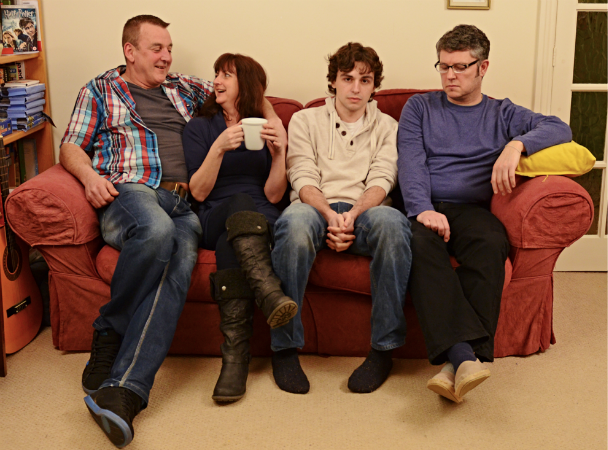
- The cast of the series opener, ‘Son, We’re Swingers’. Left to right: Gary McKinven, Angela Bell, Ethan Chapman and Stuart Packer. Photo by www.willfahy.co.uk
Finally, what is the most awkward conversation you have had in recent memory and how did you resolve it?
It’s funny how many awkward conversations come up when making a series about awkward conversations. In the ‘Necrophilia’ film, we had a talented make-up artist who came on board to make up the dead legs. We then faced an awkward conversation when we asked if she could also play the legs and explained the nature of how the actor, Ben Ellis, would be positioning himself for the opening scene. Thankfully, she was very professional and did a great job both with the make-up and playing dead! Check her work out at https://www.facebook.com/DaisyLaileyMakeUp
You can find out more about The Awkward Conversations We Have by visiting www.awkwardconversations.co.uk